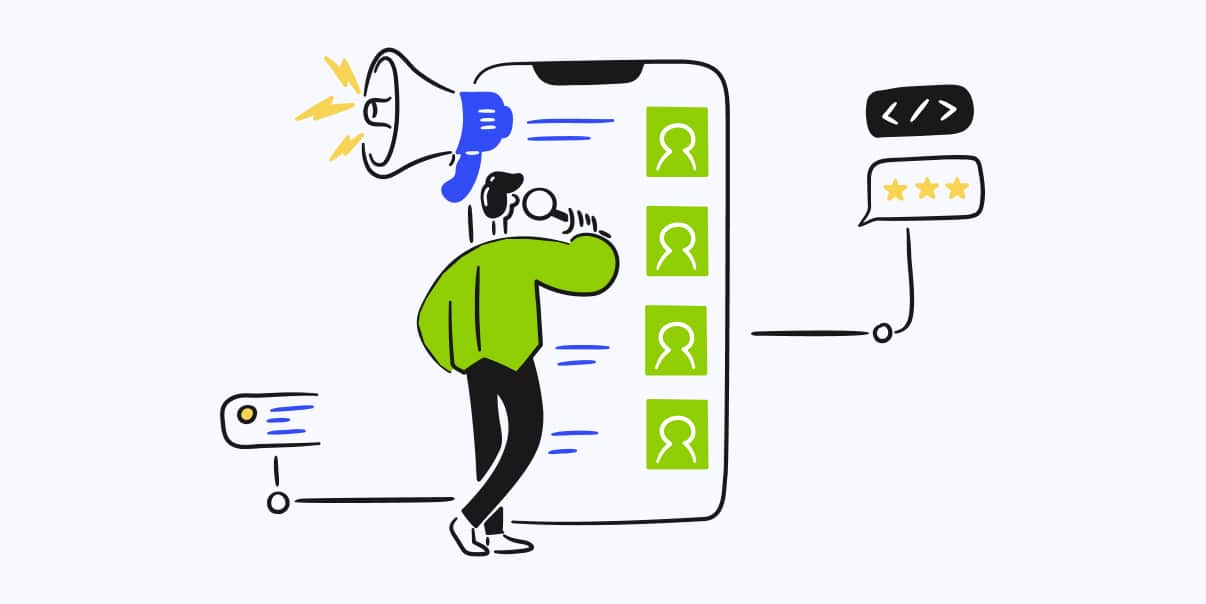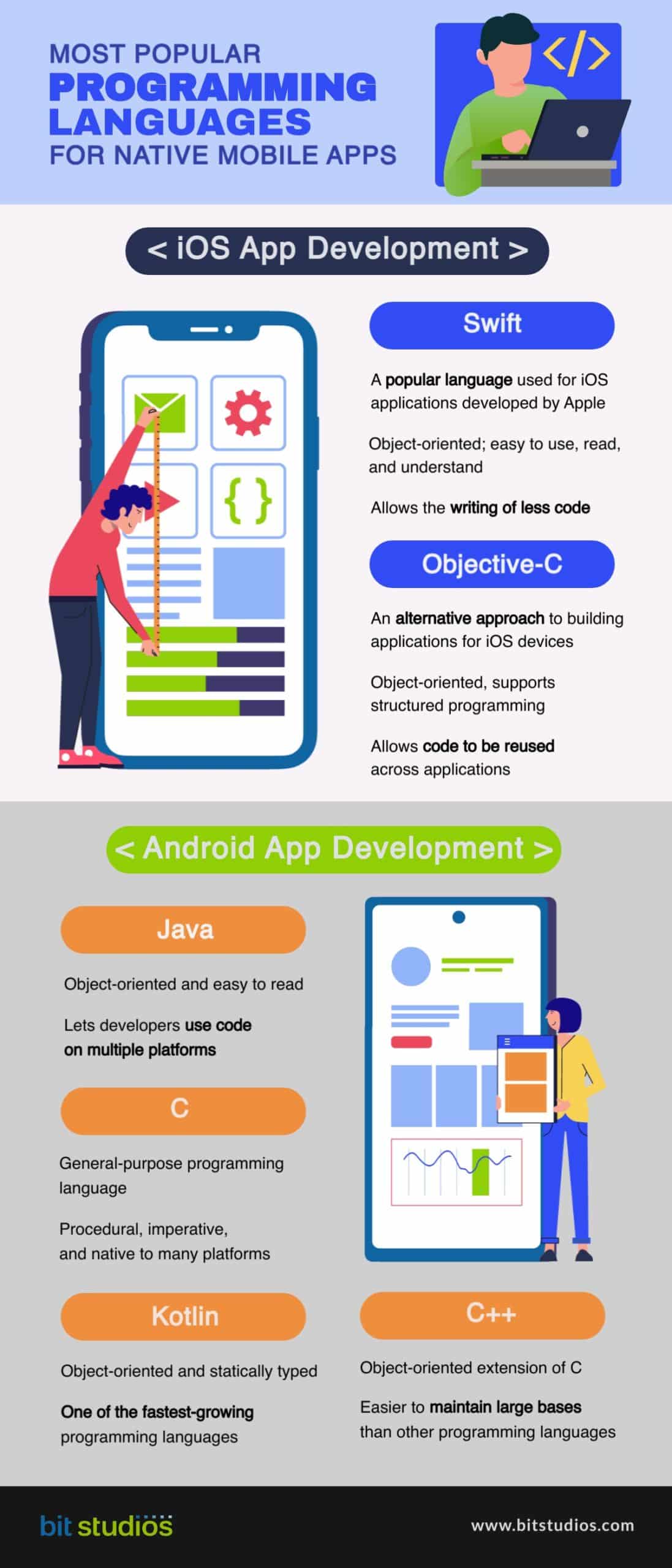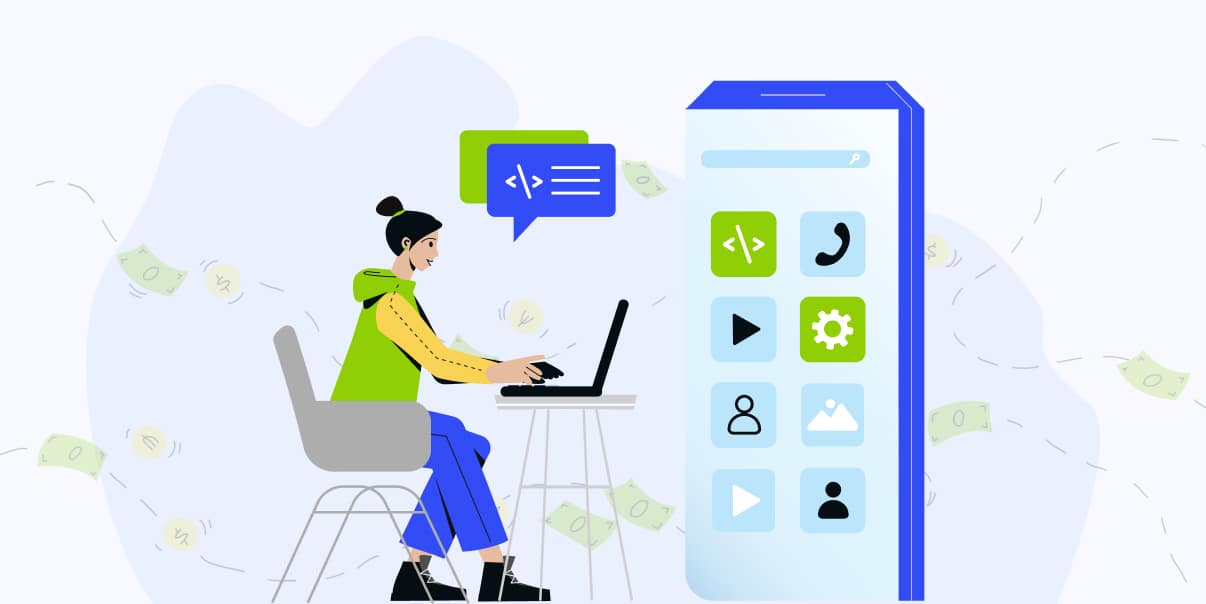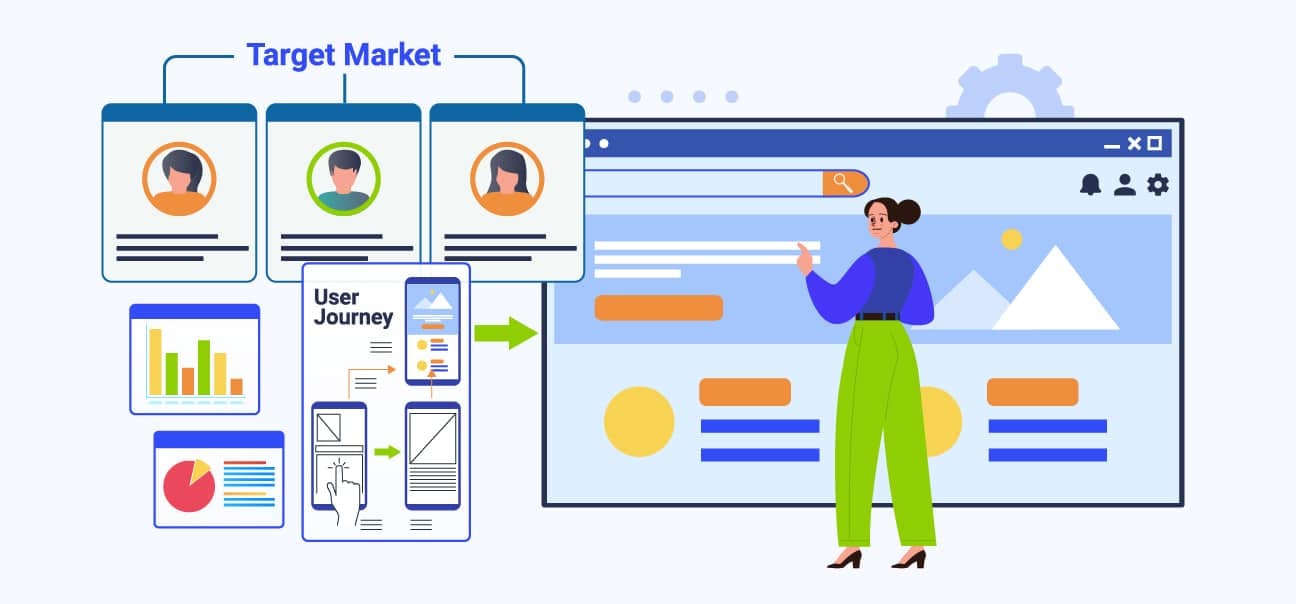A Complete Guide to the Top Mobile App Development Languages

In the past decade, mobile devices have become integral to our daily lives. According to Data Reportal, there were 5.22 billion mobile phone users at the end of 2020—that’s more than half of the world’s population! This rapid growth has led many businesses to focus on developing apps, as mobile apps have become the best way to reach customers.
The world of mobile app development is constantly evolving. What was once a limited selection of mobile app development languages has exploded into a cornucopia of options. Developers now have more flexibility to choose the correct programming language for their needs and goals.
It’s an exciting time to be involved in app development. But with so many options available, choosing the right programming languages for mobile apps can be overwhelming. Read our comprehensive guide to narrow down your search.
What Are the Types of Mobile Apps?
The first step in choosing the perfect programming language is to define the type of mobile app you want to build. Doing so helps you make a more informed decision.
Below are the different types of mobile applications:
Native
Native apps are software programs that run on a specific operating system. They work with the native programming language of that system, so they’re more efficient than web-based apps.
You can develop native apps using a variety of popular mobile app development languages. For example, Apple’s iOS platform uses Objective-C and Swift, and Google’s Android platform uses Java. Software developers often use multiple languages when developing an app to take advantage of different features in the ecosystem of each platform.
While native apps can be more expensive and time-consuming to create than web apps, they offer a better user experience. They can connect to a device’s hardware, which gives them access to its camera roll, GPS, Bluetooth, contacts, and more.
Hybrid
Hybrid apps combine features from both native and web applications. These apps allow developers to create an app that can run on multiple platforms. They are more secure than pure mobile web apps because they run in a secure container on the device. So, users will have fewer personal data leakage or privacy concerns.
Hybrid apps also offer better performance than pure web apps. They have an HTML5 code. It’s the language used for web pages, along with native code, that runs on top of it. It gives developers access to a device’s hardware features like GPS location tracking without needing extra software.
First introduced in 2011, hybrid apps became popular as they were more reliable and faster to develop than native apps. They use web technologies like HTML5, CSS3, and JavaScript to create an interface that looks and feels like a native app. But they rely on a web server for processing rather than the native device itself.
Progressive Web Apps
Progressive Web Apps are websites with an “app-like” experience. Users can install them as an icon on their smartphone or tablet’s home screen, but they still run in a browser window instead of as native software.
They are often faster than native apps because users don’t need to download anything before using them. Plus, they can load up instantly. However, they need more access to device features such as location data or push notifications. The reason is that they aren’t installed directly onto your phone or tablet like native apps are.
Software developers build PWAs using web technology. End users can access them from any browser. They can load instantly and work offline because they don’t need to be downloaded to your device to work—they’re just regular web pages.
PWAs are secure. They won’t send your private information over the internet without your permission. They can only access it if you log in, and always through an encrypted connection.
Most Popular Programming Languages for Native Mobile Apps
There are specific programming languages that suit each type of native app. We divided native apps into the most popular platforms: iOS and Android.
iOS Apps
The top two programming languages developers use to develop iOS apps are Swift and Objective-C.
Swift
Swift is a popular language used for iOS applications, and for a good reason. Apple developed Swift to be easy to use so that beginners can use it immediately. It’s an object-oriented language, which makes the process of writing code as smooth and efficient as possible. Developers can easily read and understand Swift.
People in software development consider Swift to be a high-level language. It allows you to write less code than you would in other programming languages. Swift is ideal for beginners who want to learn software development without getting overwhelmed with complex syntax.
Objective – C
Many developers today use Objective-C because it offers an alternative approach to building applications for iOS devices.
It’s also an object-oriented language. Objective-C is an extension of the C programming language. It allows you to write software that can run on multiple platforms, including Mac OS X, iOS, Android, Windows, Linux, and other Unix derivatives.
Objective-C is an imperative language that supports structured programming. It has classes that organize code into modules or components, making it easy to reuse code across applications.
Android Apps
For android app development, developers prefer Java, Kotlin, C, and C++.
Java
Java is an object-oriented development language. It means that it uses classes, objects, and interfaces. Its syntax is similar to other high-level languages like C++ and C#. If you have used those, using Java will be a breeze.
The main benefit of using Java is its readability. Java Developers only need to write the code once. Then they can use it on multiple platforms. They can use the code in Windows, Linux, and macOS. Java has built-in support for graphics, and multimedia elements, which are essential for developing games.
Kotlin
Kotlin is one of the fastest-growing programming languages in the world. It’s a statically typed, object-oriented language that runs on the Java Virtual Machine. And it’s one of the most popular choices for Android app development.
The biggest reason for its popularity is that it can work with Java. If you’ve already built an Android app in Java, you can easily add Kotlin to your codebase and start immediately.
It has many features that support functional programming, such as lambda expressions, which developers can use to create anonymous functions. It also has a robust type system. Kotlin also supports advanced concepts such as type inference, extension functions, delegated properties, and null safety.
C
C is a general-purpose programming language developed in the early 1970s. It’s one of the world’s most widely used programming languages. Software developers use it for various applications, including operating systems, web servers, compilers, and embedded software.
It’s procedural, which means it uses explicit steps to execute commands and functions. It’s imperative, meaning that it describes how programmers should perform tasks rather than what result they should achieve. C is native to many platforms, such as Windows, macOS, and Linux. This means that programs written in C can be compiled directly into machine code without any intermediate language translation.
C++
C++ is an object-oriented extension of C. It improves upon C’s syntax and features. While C is a procedural language, C++ supports object-oriented programming and other paradigms, such as functional and generic programming.
C++ is faster than C, which means it will run faster on your device. It also offers better memory management than its predecessor, which could reduce memory leaks. Finally, because it’s object-oriented, it’s easier to maintain large code bases than with other programming languages like Java or Python. There are many types of Android devices with varying hardware capabilities. So, having a language that can handle all those variables is crucial.
Programming Languages for Hybrid Apps
What is the best programming language for hybrid app development? There are quite a few options, each with advantages and disadvantages. Let’s take a look at a few of them:
C#
C# is a general-purpose programming language developed by Microsoft. It’s a popular programming language for developing enterprise and web applications. C# has a simple and powerful syntax, which makes it easy to learn and use. The language is object-oriented, supporting multiple programming paradigms, including functional, imperative, and generic.
C# runs on the .NET framework platform. Mobile app developers write it in C. Another feature of C# is the Common Language Runtime (CLR), which provides language interoperability with other languages in the .NET framework.
The language supports many other features like operator overloading, exception handling, garbage collection, and partial classes.
JavaScript
JavaScript is a dynamic programming language used in web app development. It allows programmers to add functionality to their websites without downloading additional software, making it ideal for hybrid apps.
JavaScript is an increasingly popular choice for hybrid apps. It allows developers to code using HTML elements rather than writing code from scratch whenever they want something new added to their app. This makes it easier for programmers to learn to write code from scratch. They can copy and paste their HTML code into their JavaScript file. JavaScript also integrates nicely with CSS3 stylesheets and HTML5 features.
The good thing about JavaScript is that it runs on both the client and server sides, so developers can write code that will run locally on your device and remotely.
HTML5
HTML5 is a markup language used to structure and format content on web pages. It earned the nickname “Language of the Web” as it runs on browsers. While programmers can use it with other languages, they often use it alongside JavaScript.
HTML5 has many advantages over Java. One is the native support for audio and video playback without plugins. With HTML5, you don’t have to use third-party plugins, drag-and-drop functionality, geolocation awareness, and offline web app functionality.
HTML5 does not yet support all aspects of hybrid app development, such as notifications. So, consider another language if you’re looking for features beyond what HTML5 provides.
Dart
Dart is an object-oriented programming language developed by Google for building fast and efficient hybrid apps. Mobile app developers can use it to create user interfaces, develop databases, and write command-line programs. Dart is an excellent choice for developers who must build a robust application from scratch.
Dart has an extensive library of tools and packages to provide developers with the necessary support to deliver high-performance results. The language is designed for scalability, allowing developers to easily adjust the code as the project grows.
Programming Languages for Web Apps
If you’re building a web app, your chosen programming language makes a big difference. While there are many different options, some languages are more popular than others.
To help you pick the best programming language for your project, we’ve compiled a list of web app development’s most popular ones.
Ruby
Ruby is a dynamic, open-source programming language used to build websites, mobile apps, and desktop applications. It’s also one of the most popular languages for building progressive web apps. Ruby was created in 1995 by Yukihiro Matsumoto, who wanted to create a programming language that beginners could learn quickly. He named it after the ruby gemstone, the birthstone of one of his colleagues.
Ruby is famous because it’s easy to learn. It also has many features that make writing programs easier than JavaScript or Python. Because of this, Ruby has become one of the most popular languages for progressive web app development. It can help developers create fast websites that work on multiple devices like phones or computers with little effort from the developer.
CSS
CSS (Cascading Style Sheets) is a language that describes how elements on a web page should look. Programmers can use it to change colors and fonts, create animations, and more.
CSS is a programming language that allows you to style your websites and apps. It does not have any functionality of its own. But programmers can use it to manipulate the CSS of other elements and create new styles.
CSS is used extensively in progressive web apps because it makes them more functional without JavaScript. This means they are faster and more reliable than those with JavaScript-only functionality.
PHP
PHP is an open-source language used to create everything from simple blog sites to complex databases. It’s a top choice for developing content management systems, shopping carts, and other e-commerce solutions.
The PHP community has developed many frameworks, like Laravel and Symfony, that simplify app development. These frameworks provide structure to your project so you can focus on creating features rather than managing technical details.
The popularity of PHP is due in part to its cross-platform compatibility. It runs on Windows, Mac OS X, Linux/Unix servers, and Android devices.
React
React is a JavaScript library for building user interfaces. It’s a front-end library, so it doesn’t work with back-end code. But it can run alongside other libraries and frameworks.
React was created by Facebook in 2011. The company initially used React to build the news feed feature of Facebook. Since then, it has become one of the most popular programming languages for progressive web apps.
React is known for its simplicity and ease of use. It’s also popular because it uses a component-based approach that makes it easier to manage changes as your app evolves. So React is an excellent choice if you’re starting with web development or need something lightweight yet powerful enough to meet your needs.
Python
Python is a language programmers use to build many web applications and websites. It’s also one of the most popular languages for Progressive Web Apps.
Python is a general-purpose programming language that’s been in use since 1991. It’s easy to learn and use, even if you’re not an experienced programmer. Python is open-source and free to use, so it doesn’t cost anything to download and install on your computer.
Python is popular for Progressive Web Apps because it’s easy to integrate with other languages like C++ or Java. It also has an extensive library of third-party modules to help you navigate the application.
Factors To Consider in Choosing a Mobile App Development Language
Before you decide on which programming language to use, make sure to check all the factors outlined below. The success of your app depends highly on your choice.

Type of Mobile App
The first step in choosing your app development language is figuring out what type of mobile app you want to build. Many languages are available for developing apps, but some have better support for certain types of apps than others.
Suppose you’re building an app for iOS devices using Swift. In that case, writing it in something other than Java or Python is best. These languages don’t have as much support for native iOS development as Swift does.
The Complexity of the Mobile App
Another factor that should influence your choice is your application’s complexity. Some languages are better suited for simple applications. In contrast, others are more appropriate if you create something more complex or feature-rich. For example, if you are building an application that requires a lot of memory and processing power, then using Java would be more appropriate than using Swift or Kotlin.
Team Knowledge
Suppose you have a team of developers who already know Objective-C, Swift, or Java. In that case, it’s worth sticking with that language. It will save you time and money in the long run.
If your team doesn’t know any of those languages but wants to learn one, it will be more expensive and take longer. But if your team needs more experience with mobile app development, start with something more straightforward, like HTML5 or JavaScript. They can get their feet wet before learning something more complex like Objective-C or Swift.
Budget
Budget is another important consideration when choosing a mobile app development language. Most languages for mobile app have free and paid tiers. Explore your options before deciding. Some popular programming languages are more expensive than others, so if you’re on a tight budget, it might be worth looking into some of the cheaper options.
If you have a high-end device that supports one or more operating systems, you’ll need to factor in the cost of acquiring it. Suppose you don’t have access to such devices. In that case, it might be worth spending extra money on them if they can improve your productivity or facilitate quicker turnaround times.
Conclusion
Mobile app development is a vast field. The languages you use to build your app depend on what you’re trying to accomplish.
Some languages are more popular than others and for a good reason.
Whatever your needs are regarding mobile app development languages, we hope this guide has provided helpful information on what they are and how they work.
If you’re ready to get started on your mobile app, we’re here to help. Our team of experts will work with you to ensure your project is a success—no matter what language it’s written in. We take pride in our work and want nothing more than for you to be happy with the result.
We also understand that budget is essential for projects like this. So, if you have any questions about pricing or want a free quote on your next project, give us a call or send us a message!
Frequently Asked Questions About Mobile App Development Languages
Is Kotlin better than Java?
Software developers can use Java and Kotlin to create Android apps. JetBrains developed Kotlin in 2010, and it’s an alternative to Java.
Kotlin is more concise than Java, meaning it uses fewer lines of code to achieve the same result. It helps developers write code quickly and easily. The syntax also allows for more readable code, which makes it easier for other developers to understand what you’ve written.
Kotlin also offers many other benefits over Java, including:
- Support for nullability and immutability
- The ability to use functions as first-class citizens
- Built-in support for coroutines called “green threads”
Kotlin is newer and has some advantages over Java. But it’s not easy to find expert Kotlin programmers. If you find one, their services will probably be expensive due to the smaller pool of Kotlin developers.
If flexibility matters to you, the right programming language would be Java. The language has been around for a long time, and many companies use it. Java is also a robust general-purpose programming language that programmers can use for many projects.
But ultimately, your choice depends on your mobile app’s requirements. If you want to write a game that requires fast performance, Kotlin may be the right choice. If you’re building a business app that needs to be scalable, Java is better suited for your needs.
Which language do developers most prefer for mobile app development?
According to Statista, software developers’ most commonly used programming languages were JavaScript and HTML/CSS. Python, SQL, and TypeScript made it into the world’s top five most widely used programming languages for mobile apps.
Below is a brief description of the top five most used languages:
JavaScript is one of the world’s most widely used programming languages in developing mobile apps because of its popularity in web browsers. It’s the go-to language for front-end development as it can run on desktop and mobile devices.
HTML is another popular language that allows developers to create websites. Developers use it with CSS to add style elements to your website.
Python has an extensive library of modules. It is one of the most versatile programming languages. Developers can use it to develop cross-platform apps, web apps, desktop applications, and even mobile apps.
SQL stands for Structured Query Language and is used by database management systems like MySQL or PostgreSQL. It’s also the language behind relational database management systems like Microsoft Access or Oracle’s SQL Server Express Edition.TypeScript is popular because it allows developers to use all of the features of JavaScript. Moreover, it has powerful features like classes, interfaces, and modules.
We’re BIT Studios!
At BIT Studios we specialize in designing, building, shipping, and scaling beautiful, usable products with blazing-fast efficiency



